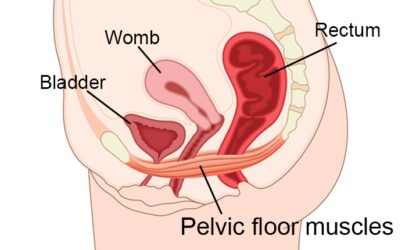by Aimee Keller, PT, DPT
Are you experiencing pelvic pain, back pain, or lack of control of your bowels and bladder? It may be because of your pelvic floor, but not to worry. Physical therapy can help!
What is the pelvic floor?
It is a group of muscles that act as a hammock between the tailbone, pubic bone, and hip bones. These muscles help support the abdominal organs when you are standing. They also have a large influence on stabilizing the spine when performing daily activities, as well as give you control over relieving your bowels and bladder. Just like any other muscle in the body, sometimes the pelvic floor muscles can become weak, tight, or painful; causing difficulty when it comes to supporting our abdominal organs, supporting the spine, and with maintaining urinary and fecal continence.
influence on stabilizing the spine when performing daily activities, as well as give you control over relieving your bowels and bladder. Just like any other muscle in the body, sometimes the pelvic floor muscles can become weak, tight, or painful; causing difficulty when it comes to supporting our abdominal organs, supporting the spine, and with maintaining urinary and fecal continence.
Symptoms of pelvic floor muscle dysfunction
Symptoms of pelvic floor dysfunction affect both men and women. However, women often assume that their symptoms are “normal” following pregnancy or are just a part of aging. While common, these types of issues are never considered normal and can severely impact quality of life. Dysfunction of the muscles can present as pain in the pelvis or low back, uncontrolled leakage of urine or stool, or prolapse of pelvic organs. A pelvic health physical therapist can help identify dysfunctional muscles of the pelvic floor and can determine the proper plan of care to work towards getting these muscles to function properly again. Retraining the muscles can help reduce pelvic and back pain, pelvic organ prolapse, and improve control of bowels and bladder.
Physical therapy for the pelvic floor
Pelvic health physical therapy consists of meeting with a DPT specifically trained to treat muscles of the pelvic floor. Your physical therapist will assess your current symptoms and medical history. They will also do a physical examination to identify the root cause and develop an individualized plan of care. You will be instructed in a home exercise program and lifestyle changes to help you take control of your symptoms. Your therapist may also use techniques such as manual therapy, electrical stimulation, or biofeedback to further assist retraining the pelvic floor.
Reach out online or give us a call at 866-588-0230 today to set up an appointment with one of our pelvic health specialists to get started on taking control of your life again!



